Alibaba is the globe’s premier online marketplace, presenting an extensive array of wholesale vendors to procure merchandise for resale.
Suppose you cannot visit a tradeshow such as China’s renowned Canton Fair.
In that case, Alibaba provides an excellent alternative for connecting with trustworthy Chinese Alibaba wholesale suppliers for your e-commerce venture.
Wondering, “Is Alibaba legit and how to buy on Alibaba?” This article clarifies that concern, offering vital insights on acquiring and ordering samples from Alibaba with assurance.
By adhering to these guidelines, you can confidently navigate Alibaba wholesale sellers, access Alibaba order samples from Alibaba, and make informed decisions based on Alibaba reviews.
Whether you’re exploring Alibaba clothing options or pondering how to leverage Alibaba for Amazon sales, understanding the process of ordering samples from Alibaba is crucial.
Furthermore, this guide illuminates strategies for safe and effective transactions, addressing common queries like “Is Alibaba a scam?” or “How to engage in dropshipping with Alibaba.” Additionally, for those considering Alibaba to Amazon FBA ventures or seeking to compare 1688 vs Alibaba, this resource provides the essential knowledge, including Alibaba logistics tracking advice, to enhance your e-commerce success.

Table of Contents
ToggleWhat is Alibaba?
Alibaba stands as a colossal Alibaba wholesale platform where you can connect with manufacturers for bespoke products or source off-the-shelf items for your business.
Often touted as the world’s most extensive e-commerce entity, Alibaba competes neck and neck with Amazon.
If you’re contemplating using Alibaba, here’s why it could be a strategic move:
- Access to Alibaba Wholesale Pricing: The most significant allure is Alibaba wholesale pricing, enabling purchasers to secure substantial profit margins, often exceeding 66%.
- Vast Product Range: The diversity of products on Alibaba is astounding, offering you ample choice to fulfill your specific needs or venture into new markets.
- Brand Customization: Alibaba empowers you to personalize products with your branding, offering a unique opportunity to establish your label.
- Tailored Product Creation: The platform allows for the customization of products based on your designs, providing a unique edge in the market.
- Direct Manufacturer Engagement: Alibaba facilitates direct interaction with manufacturers, granting you influence over the design, production, and delivery of your products.
It’s crucial to understand that while Alibaba connects you with suppliers, it operates independently from the actual manufacturing entities.Essentially, Alibaba is not a retailer but a conduit to manufacturers and suppliers.
Contrary to Amazon’s retail-focused model, Alibaba serves as a directory for Alibaba wholesale transactions directly with manufacturers.
Alibaba excels as a B2B platform, especially for Alibaba wholesale buyers, catering to bulk transactions, whereas eBay, Amazon, and Etsy predominantly target B2C or C2C markets, engaging individual consumers through direct sales or auctions, especially for Alibaba wholesale buyers.
Is Alibaba Legit And Safe?
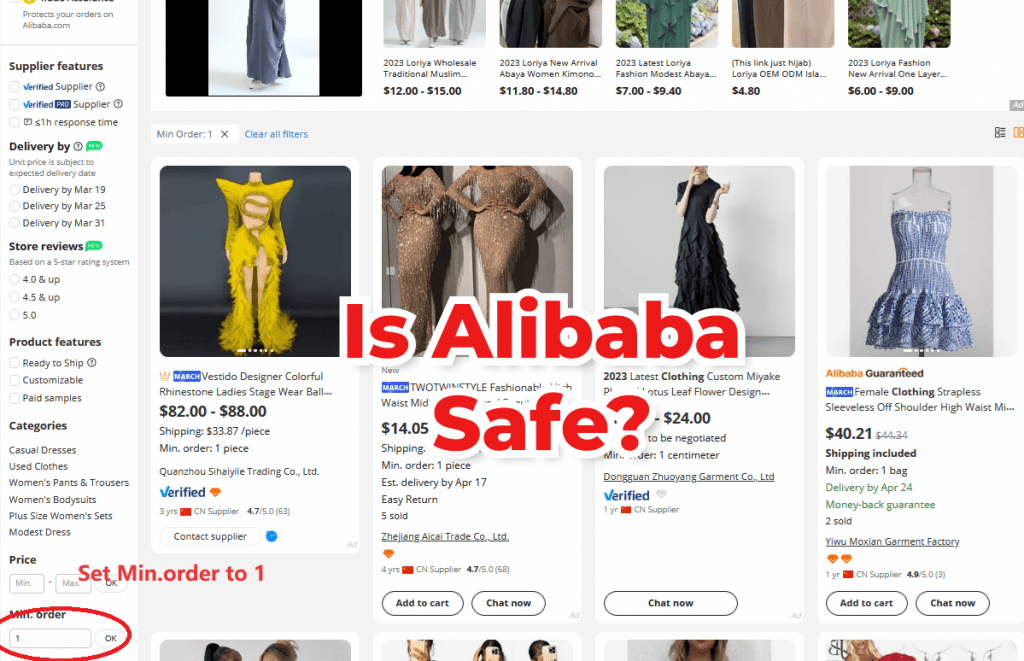
Buying from Alibaba is generally considered safe. But, it’s still important to review Alibaba’s terms of service as part of understanding how to buy on Alibaba safely.
However, to enhance your safety, it’s crucial to familiarize yourself with Alibaba’s terms of service, which is an integral step in learning to navigate purchases securely on the platform.
By the first quarter of 2022, Alibaba boasted over 903 million active users, affirming its status as a reliable and esteemed marketplace.
Here’s the essence of how Trade Assurance functions:
- While exploring suppliers on Alibaba, keep an eye out for the Trade Assurance badge. Engaging with suppliers under this program ensures your order is safeguarded.
- To activate this protection, it’s imperative to process your payment through Alibaba’s secure online system. Payments made outside of Alibaba’s platform aren’t covered by Trade Assurance.
- Should any issues arise post-delivery, you’re entitled to lodge a refund request within a 30-day window.
Utilizing Trade Assurance incurs no extra charges, although choosing certain payment methods might attract processing fees.
Once you’ve compensated your supplier via Alibaba and encounter delays in shipping or discrepancies in product quality, Alibaba steps in to mediate and address your concerns.
If a satisfactory resolution remains elusive, Alibaba’s policy is to reimburse your expenditure, thereby ensuring a risk-free purchasing experience.
Hence, transactions on Alibaba are safeguarded, endorsing the platform’s reliability for your business needs,
Can Anyone Buy From Alibaba?
Alibaba is accessible to everyone at no charge, eliminating the need for business credentials, a seller’s permit, or even a website to get started.
The primary concern for suppliers on Alibaba is finding partners who can commit to purchasing in volume on a regular basis.
They prioritize establishing relationships with Alibaba wholesale buyers who demonstrate the ability to place consistent, bulk orders for Alibaba wholesale, ensuring a stable and mutually beneficial business connection.
This aspect makes Alibaba an ideal platform for entrepreneurs and businesses looking to source products in larger quantities, regardless of whether they have a formal business structure or an established online presence.
How To Buy On Alibaba?

Understanding how to buy on Alibaba can significantly streamline your procurement process, ensuring you get quality products on time.
Here’s a simplified guide to buying from Alibaba:
- Know Your Niche: Understand the specific niche you want to target to make informed purchasing decisions.
- Visit Alibaba.com: Access the vast marketplace that Alibaba offers.
- Register Your Details: Provide your information to create an account or initiate contact with suppliers.
- Search for Suppliers: Explore and evaluate various suppliers to find ones that match your business needs.
- Engage with Suppliers: Once you’ve selected potential suppliers, reach out to them to establish communication.
- Negotiate Terms: Discuss pricing, payment terms, and order specifics to ensure you’re getting the best deal.
- Review Your Order: Always double-check your order details before finalizing to avoid any discrepancies.
The beauty of Alibaba is its accessibility; it’s free to use and doesn’t require you to own a business, hold a seller’s permit, or even have a website.
Your main objective should be demonstrating the capability and intent to purchase in bulk consistently. This is what suppliers on Alibaba are most interested in – reliable buyers who can commit to regular, large-volume purchases. This approach not only fosters trust but also builds a lasting business relationship with your chosen suppliers.
1. Know Your Niche
Before leveraging Alibaba’s extensive marketplace, it’s pivotal to have a well-defined niche, an essential precursor to launching a successful online store.
Our Insight: If you’re still pinpointing your niche, consider delving into resources like “How To Find The Best Products To Sell Online – The Ultimate Step By Step Guide,” ensuring you’re equipped with the knowledge to select profitable items.
Validating your product choice is crucial before placing significant orders on Alibaba, a platform renowned for its legitimacy and vast product assortment.
Conduct thorough market research to ascertain a viable market for your intended inventory, addressing the critical question: ‘Is Alibaba safe to buy from?’, ‘ Is Alibaba legit?’.
You should be conversant with the specifics of ‘Alibaba order sample’ processes or ‘ordering samples from Alibaba’ to verify product quality before bulk purchasing, especially for Alibaba wholesale buyers.
Analysing retail prices, particularly on platforms like Amazon, provides insight into potential profit margins.
If aiming for a 66% margin, for instance, sourcing a product that sells for $21 on Amazon should ideally cost less than $7 on Alibaba.
2. Visit Alibaba.com
If you’re clear about your niche and ready to dive into sourcing from Alibaba, the first step is straightforward: navigate to Alibaba.com.
Once there, you’ll spot a “Sign Up” button prominently displayed on the homepage. Clicking this will initiate the account creation process, guiding you through a series of steps to establish your profile on the platform.
This account will be your gateway to exploring the extensive ‘Alibaba wholesale’ marketplace, perusing ‘Alibaba reviews,’ and initiating ‘Alibaba order sample’ requests to ensure product quality before committing to bulk orders, especially for Alibaba wholesale buyers.
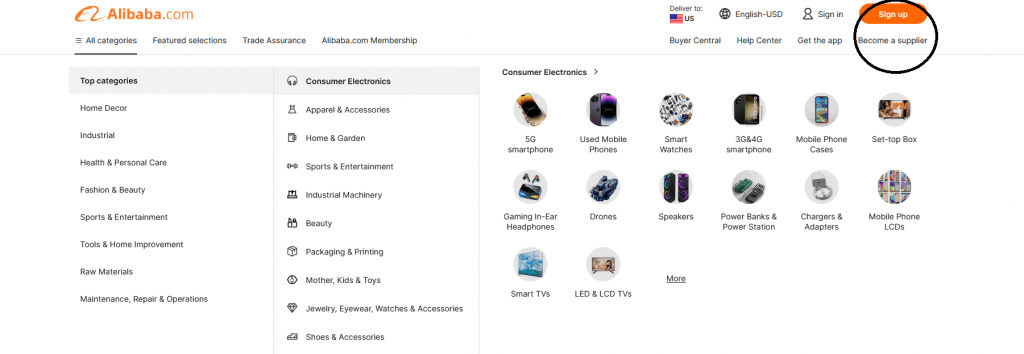
It’s important to note that while you don’t need to have an account on Alibaba just to browse or search for suppliers, having one unlocks additional benefits and services. If you intend to utilize Alibaba’s features like trade assurance, which offers a layer of protection for your transactions, creating an account is essential.
3. Register Your Details
Setting up a separate email account specifically for your Alibaba activities is a strategic move.
Once you start engaging with suppliers on Alibaba, you’re likely to receive an influx of communications.
You’ll need to input this email address during the sign-up process and then proceed with the verification step.
This verification typically involves clicking on a confirmation link sent by Alibaba to your new email address, ensuring the security and validity of your account setup.
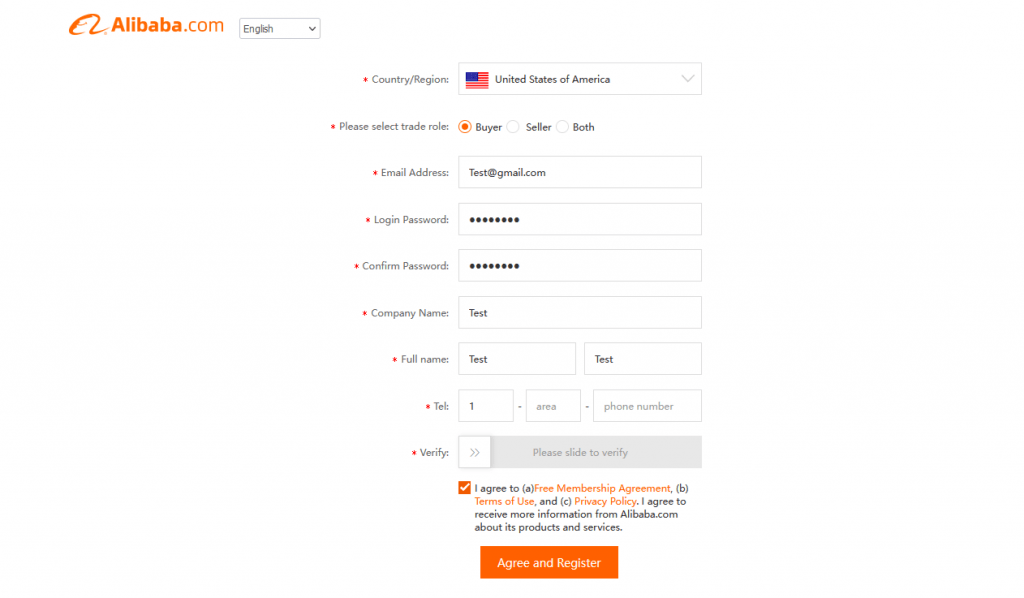
4. Search for Suppliers
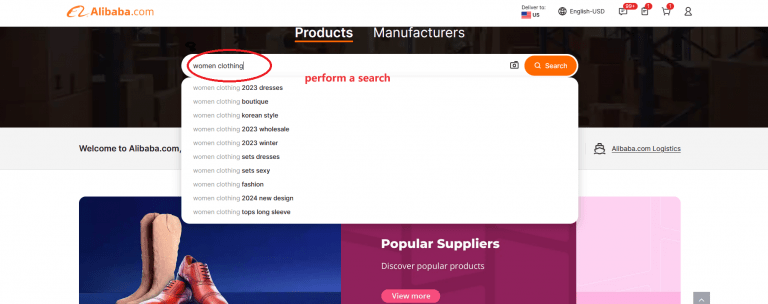
For instance, if you were sourcing for a women clothing retail outlet, you’d simply input “women clothing” into Alibaba’s search field.
You have the option to refine your search further by selecting “Manufacturers” instead of “Products” to focus on direct producers.
Executing this search on Alibaba will present a variety of suppliers pertinent to your search query.
You’ll have the opportunity to review their offerings, gauge lead times, and assess the possibility for customization.
This process is instrumental in ensuring you partner with a supplier that can meet your specific requirements, whether you’re interested in ‘Alibaba wholesale’, exploring ‘Alibaba clothing’, or examining ‘Alibaba order sample’ processes for quality assurance.
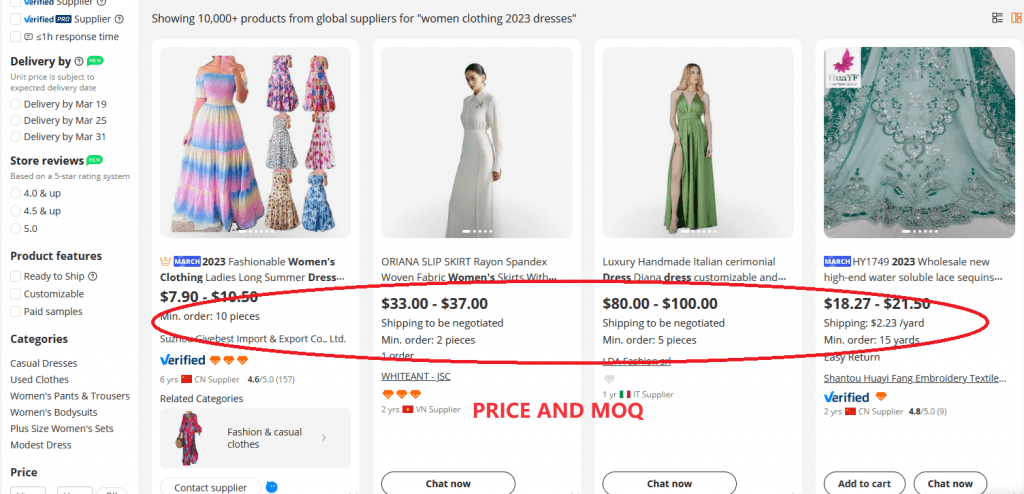
When exploring Alibaba to find suppliers, it’s crucial to scrutinize two key factors: the price and the minimum order quantity (MOQ) – the smallest quantity a manufacturer agrees to produce in a single run.
Aligning with manufacturers that match your budget is essential, especially since some may demand substantial initial purchases.
Purchasing in larger volumes typically secures better pricing. However, it’s important to approach Alibaba’s listed prices with caution; they can often be misleading.
The figures you see on the site might not reflect the best possible deal—you’ll likely find that prices are more negotiable than they initially appear.
To ensure you’re getting competitive rates, it’s wise to contact various suppliers to gather multiple quotes.
Additionally, leveraging a platform like 1688.com, Alibaba’s sister site, can offer a benchmark for assessing the quotes you receive, ensuring they’re reasonable.
Comparing prices between Alibaba and 1688.com can offer insights into whether you’re getting a fair deal.
It’s important to recognize 1688.com as Alibaba’s Chinese counterpart, serving primarily Chinese domestic sellers and often featuring significantly lower prices than Alibaba.com.
This price discrepancy can be a valuable indicator of the minimum rates suppliers might accept.
However, exercise caution when comparing these two platforms. The lower prices on 1688.com could be reflective of varying quality standards or product specifications not aligned with international markets. Additionally, navigating 1688.com might present a challenge, as the site is entirely in Chinese, which can complicate research for those not fluent in the language.
5. Engage with Suppliers
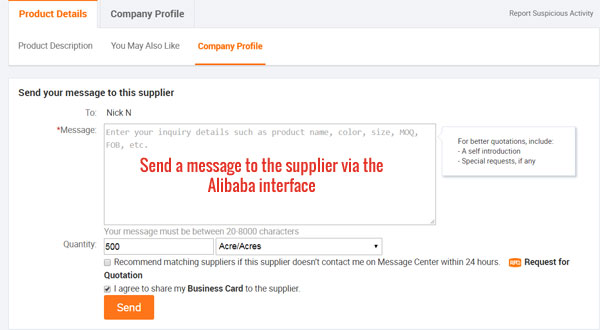
After you’ve pinpointed the ideal product, it’s time to engage with the supplier on Alibaba.
You’ll find an option to “Contact Supplier” or use a chat feature directly on the product page for immediate communication.
Requesting and ordering samples from Alibaba is a key step in ensuring product quality before committing to a large order.
Most suppliers on Alibaba are prepared to provide samples so you can ordering samples from Alibaba, often indicated by a “Get samples” button on their product listing.
It’s crucial that a supplier is open to sending sample orders. If they’re not, it’s wise to consider other suppliers.
While samples might come at a premium cost due to individual crafting, investing in them can prevent future disappointment from bulk orders, especially for Alibaba wholesale buyers.
When connecting with suppliers, aim to clarify the following:
- Minimum Order Requirements: Understand the smallest quantity you can order.
- Sample Pricing: Be aware that ordering samples from Alibaba might be chargeable, and always factor in shipping costs.
- Definitive Production Pricing: Seek clarity on the exact price per unit, which can vary, especially with customized orders.
- Production Timeline: Determine the manufacturing and shipping duration, remembering that international shipping can extend lead times significantly.
- Payment Terms: Discuss payment modalities and prefer keeping transactions within Alibaba for added security, especially for considerable payments. Inquire about flexible payment options for future transactions.
When contacting a supplier:
Press the “Contact Supplier” button and prepare to communicate effectively, knowing that reputable suppliers handle numerous inquiries daily. Present your requirements confidently and concisely.
Here’s a modified script example for initial contact:
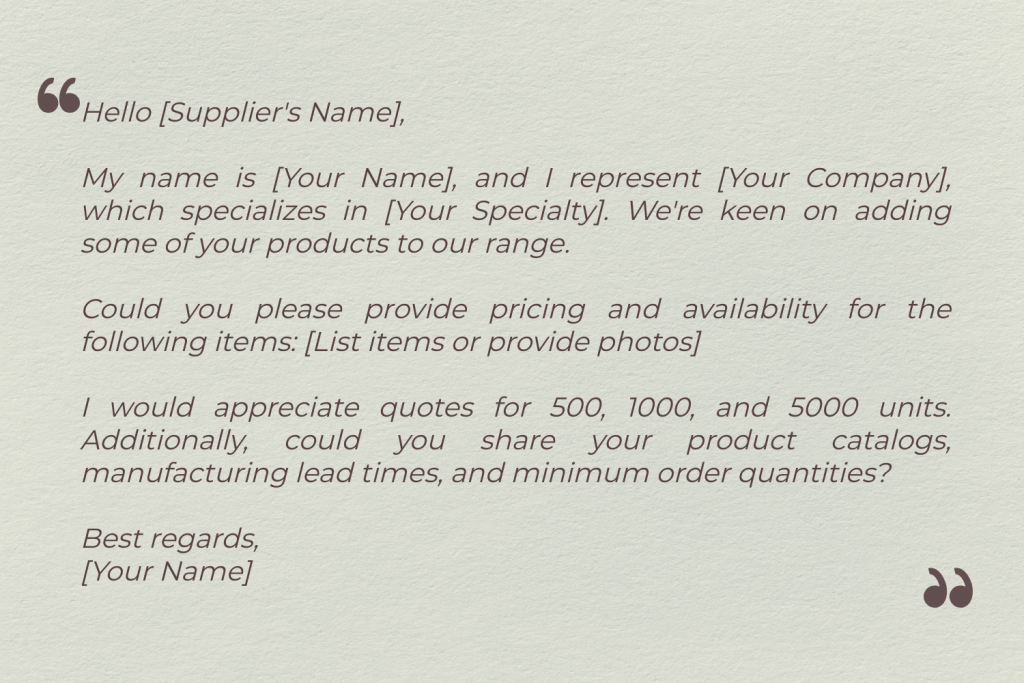
The message crafted for supplier outreach is succinct, professional, and focused. It also strategically requests quotes for varying order sizes.
Requesting pricing for large quantities, such as 5000 units, even if you don’t intend to purchase that amount immediately, is beneficial.
This approach suggests to suppliers that you are a serious buyer with the potential for significant orders, potentially influencing more competitive pricing or favorable terms.
6. Negotiate Price

After reviewing a sample and finding it meets your standards, it’s time to discuss pricing with the seller.
Negotiation is a standard expectation with most suppliers in China, and interacting with various suppliers on Alibaba can enhance your bargaining position.
Be aware that your agreed-upon price may not cover shipping fees. It’s crucial to ascertain these additional costs separately to ensure they don’t erode your profit margins.
By gathering multiple quotes, you should gain a solid understanding of your product’s sourcing cost.When negotiating, remember that the sample price should remain off the table for discussion.
Attempting to haggle over sample costs can appear unprofessional and potentially damage your relationship with the supplier.
7. Check Your Order

Before dispatching your order, it’s wise to engage a professional inspection service to scrutinize your products prior to their shipment.
Upon receiving your order, it’s crucial to conduct a detailed review. Verify the quantity to confirm it aligns with your order and inspect the quality of each item. Check for any damage, cleanliness, and whether the packaging meets your standards.
Given that inspection companies typically check a representative sample, it’s possible not all defects will be detected.
Should you discover any issues upon delivery, particularly with damaged items, it’s advisable to contact your supplier and possibly Alibaba to discuss potential refunds.
How To Buy on Alibaba A Single Product?
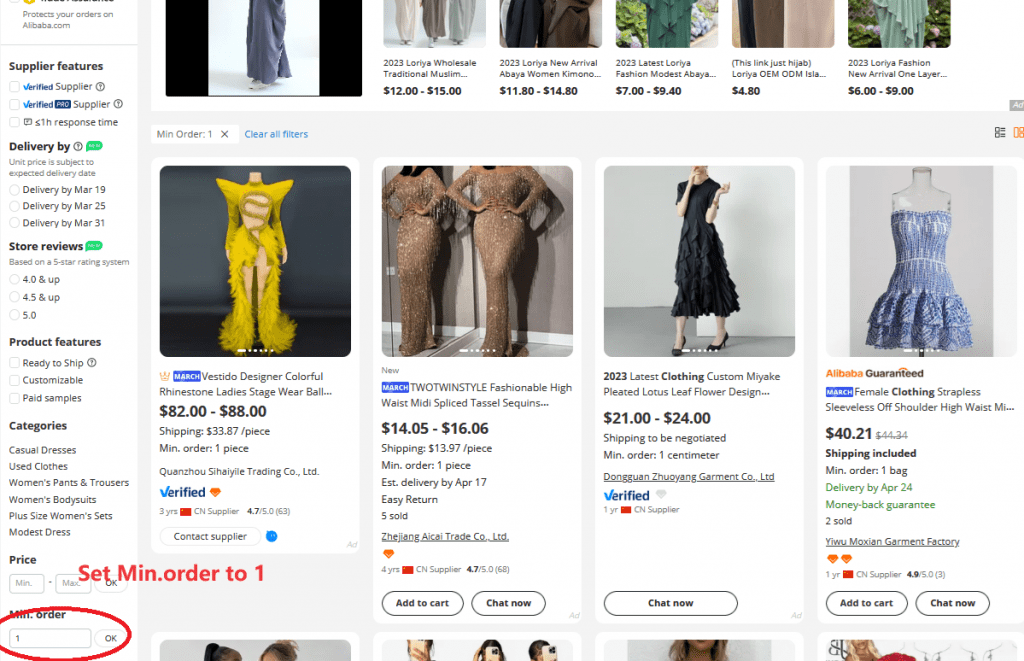
It is renowned for Alibaba wholesale deals, yet it’s possible to procure a single item with these guided steps:
Apply the ‘Minimum Order of 1’ Filter: Utilize Alibaba’s search filters to isolate suppliers open to selling in minimal quantities, down to just one item. This adjustment helps target your search to vendors with more lenient minimum order requirements.
Verify ‘1 Piece’ Minimum Order in Product Details: Delve into the product specifics listed, noting the minimum order quantity. A listing indicating ‘1 piece’ signifies the supplier’s readiness to engage in single-item transactions.
Directly Confirm Single-Item Sale Possibility: Given Alibaba’s wholesale nature, it’s prudent to directly inquire with suppliers about the feasibility of single-item orders, clarifying any flexibility in their sales approach.
Communicate Your Single-Item Interest: When reaching out to the supplier, be explicit about your intent to purchase just one unit. Discuss detailed aspects like product information, shipment costs, delivery options, and payment methods to foster clear communication and avert potential misunderstandings.
Finalize Your Single-Item Purchase: After receiving assurance, proceed with your purchase using Alibaba’s secure payment gateway to safely acquire your item.
While Alibaba accommodates single-item purchases, it primarily caters to bulk transactions, especially for Alibaba wholesale buyers. For individual buying needs, platforms like AliExpress are more apt, specifically tailored for personal shopping experiences.
Tips For Buying Safely On Alibaba
Part of becoming an expert on how to buy on Alibaba is recognizing that not every supplier on the platform is as reputable as they should be.
You may encounter vendors selling substandard products, potentially leading to customer dissatisfaction.
While Trade Assurance offers financial protection, rectifying issues and recouping funds can be a lengthy process. Therefore, preemptive measures to mitigate sourcing problems are crucial.
This proactive approach is key to navigating Alibaba successfully, ensuring you engage with ‘Alibaba wholesale’ effectively, and make informed decisions based on ‘Alibaba reviews’. It’s also fundamental in understanding processes like ‘Alibaba order sample’ or ‘ordering samples from Alibaba’, maintaining vigilance about ‘is Alibaba safe to buy from’, ‘is Alibaba legit’, or concerns that ‘Alibaba is a scam’.
1. Use Reputable Suppliers
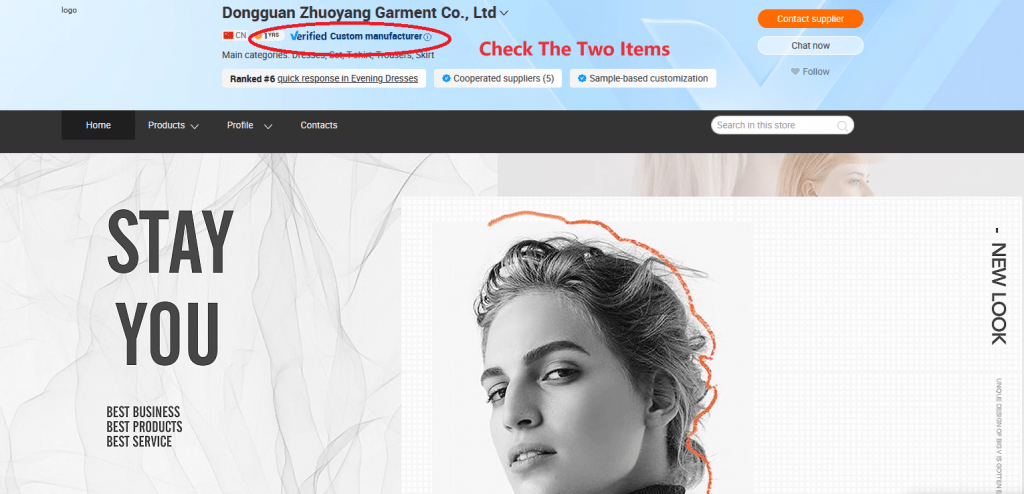
Alibaba categorizes its suppliers to help you identify those who are more credible and committed to quality.Understanding these supplier types is crucial for making informed decisions.
To gauge whether you’re engaging with a trustworthy seller on Alibaba, consider suppliers who meet all three of these criteria:
Gold Supplier: This status indicates that the supplier has invested in a membership fee, demonstrating a level of seriousness and reducing the likelihood of fraudulent activities. It’s a positive sign, suggesting that the supplier is established and more reliable, especially for Alibaba wholesale buyers.
Trade Assurance Supplier: Opting for a Trade Assurance supplier provides you with a safety net, ensuring that your products are verified before dispatch and delivered timely. If these conditions are not met, Alibaba offers a refund mechanism, giving you financial protection, especially for Alibaba wholesale buyers.
Assessed Supplier: These suppliers have undergone an evaluation by a third-party inspection company. The availability of a detailed inspection report offers transparency and reassures you of the supplier’s legitimacy and product quality.
When selecting suppliers on Alibaba, utilizing the platform’s search filters can greatly assist in this process. You can specifically look for suppliers that are tagged as “Trade Assurance” and “Verified Supplier” to refine your search, enhancing your chances of sourcing from reputable parties.
By prioritizing these supplier ratings, you’re taking a significant step toward ensuring quality and safety in your transactions.
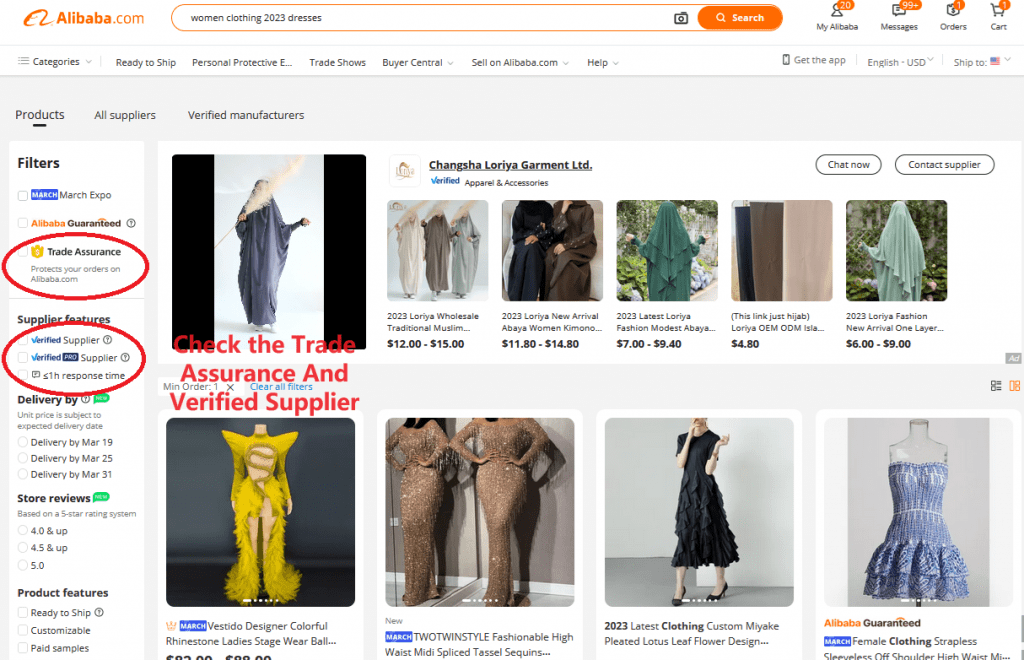
When dealing with suppliers on Alibaba, it’s crucial to exercise caution with those who insist on receiving full payment upfront, especially if they request the transaction to occur outside of Alibaba’s platform.
Such demands can signal a potential risk, suggesting the supplier might not be trustworthy, increasing your chances of encountering a scam.
To safeguard your interests, always opt for secure payment methods through Alibaba, which not only verifies the transaction’s legitimacy but also provides a level of protection under the platform’s trade assurance policies.
2. Check Alibaba Reviews and Ratings
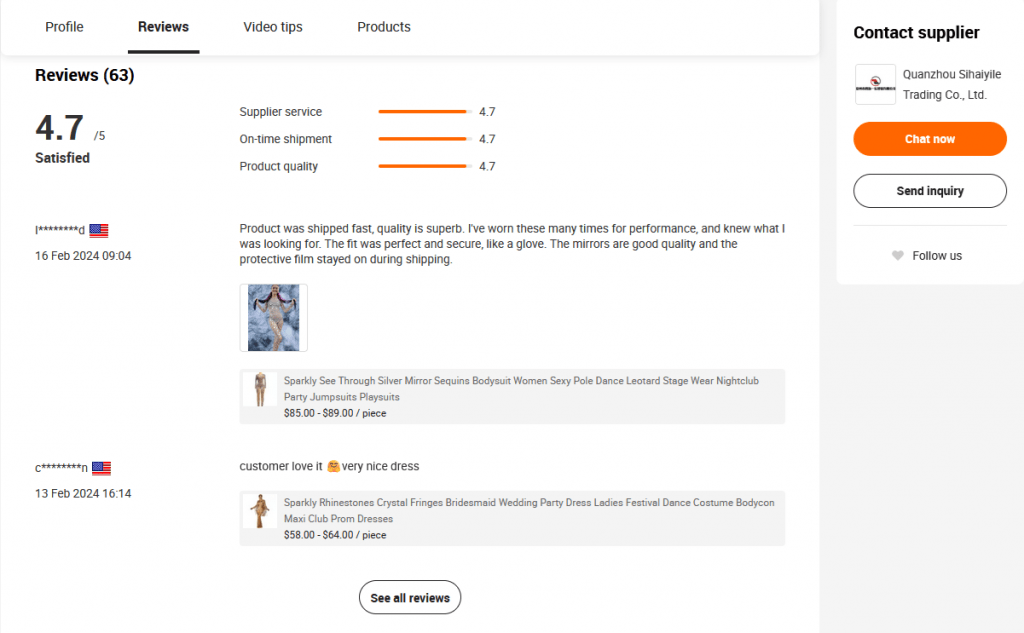
Before finalizing a supplier on Alibaba, it’s crucial to scrutinize Alibaba reviews and ratings.
While Alibaba provides its platform for feedback, extending your research to Google for additional reviews can offer broader insights.
Exploring dedicated review sites such as Supplier Blacklist can further illuminate the reputation of potential suppliers, offering a more comprehensive background check.
When perusing forums and review sites, be alert for specific warning signs:
- Exceptionally low prices paired with grievances regarding product quality.
- Reports of defective items or products arriving damaged.
- Instances where initial orders were satisfactory, but follow-up orders suffered in quality.
- Concerns raised about the manufacturing environment or labor practices.
While it’s challenging to guarantee perfect quality every time, thorough research and due diligence can significantly diminish the likelihood of encountering substandard products, especially for Alibaba wholesale buyers.
3. Avoid Brand Name Products
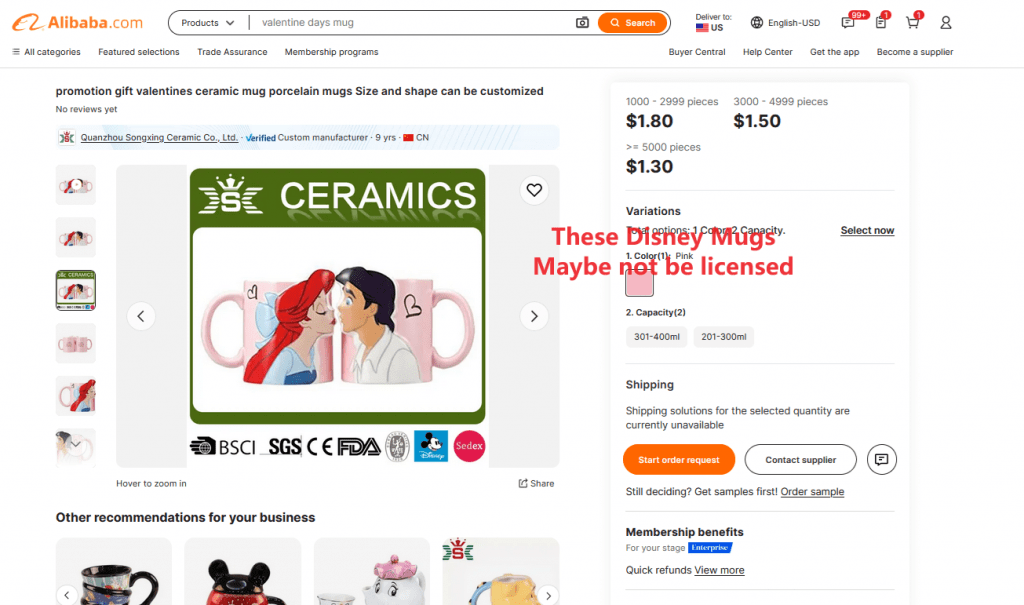
When searching for reliable suppliers on Alibaba, exercise caution with those claiming to sell brand-name products at significantly reduced prices.
Typically, licensed merchandise from well-known brands like Nike, Louis Vuitton, or Coach is not available through Alibaba.
If a supplier offers these products at low costs, it’s highly probable they are counterfeit.
Selling such knock-off products can lead to legal repercussions. Therefore, be wary of suppliers promising access to popular brands at bargain prices, as this could potentially lead to serious issues.
This vigilance is crucial in maintaining a legitimate operation, avoiding scams, and ensuring your business practices align with legal and ethical standards.
4. Trust Your Instincts

Trusting your intuition is paramount when navigating Alibaba or any marketplace.
If a deal appears overly favorable or if a supplier engagement seems unusually straightforward, it’s prudent to exercise caution.
If you encounter offerings that are remarkably affordable or if a supplier relationship progresses with unexpected ease, it’s wise to pause and reevaluate.
Being particularly cautious with suppliers from any region, including China, where the vast majority operate with integrity, is still essential.
However, it’s crucial to approach each interaction with due diligence. Verify the legitimacy through ‘Alibaba reviews’, ensure the platform’s safeguards like ‘Is Alibaba safe to buy from?’ and ‘Is Alibaba legit?’ are in place, and don’t hesitate to perform additional checks or ask for more information.
Your skepticism can be a valuable asset, guiding you to establish trustworthy partnerships while avoiding potential pitfalls in your sourcing endeavors.
What Are The Typical Challenges On Alibaba?

When searching for suppliers on Alibaba, buyers, especially for Alibaba wholesale ones, should stay alert to these frequent pitfalls:
- Dealing with Unverified Suppliers: Always choose suppliers verified by Alibaba to minimize risks. While the “Gold Supplier” status is reassuring, further vet your choices by examining Alibaba reviews, business profiles, and past transactions.
- Suspiciously Low-Priced Brand Products: Be wary of suppliers offering renowned brand products at remarkably low prices, as these are likely to be counterfeits, potentially leading to legal issues.
- Unexpected Price Hikes: Some suppliers may attempt to raise prices after you’ve committed to an order. Insist on a definitive quote and a binding contract beforehand.
- Discrepancies Between Sample and Bulk Order Quality: There’s a risk that a supplier sends a superior sample and delivers inferior bulk products. Leverage Alibaba’s Trade Assurance and specify quality expectations in your contract, especially for Alibaba wholesale buyers.
- Counterfeit Compliance Documentation: Verify the authenticity of any compliance documentation a supplier provides, staying vigilant against fake or outdated certificates.
- Communication Gaps: Inconsistent or unclear communication from a supplier could indicate potential problems.
- Alterations in Banking Information: Exercise caution if a supplier changes their banking details when it’s time to pay.
- Requests for Full Payment in Advance: Be skeptical of suppliers demanding full payment upfront, particularly through non-Alibaba channels.
- Risks of Non-Delivery: New suppliers or those with a short business history pose a higher risk for non-delivery scams.
- Fraudulent Supplier Profiles: Verify the authenticity of supplier profiles to ensure you’re not dealing with an impostor.
What Are The Ideal Product Categories On Alibaba?

Typically, it’s advisable to opt for simpler items on Alibaba to minimize the chances of receiving defective goods.
Knowledge about the products you plan to purchase can also significantly decrease potential quality problems. It’s best to focus on items that are uncomplicated and fall within your area of knowledge.
With this approach in mind, the following are some of the product categories that tend to be successful on Alibaba:
- Home and Kitchen Appliances
- Beauty and Personal Care Items
- Pet Supplies
- Sports and Entertainment Merchandise
- Toys
- Fashion and Apparel
Incorporating these practices can enhance your buying experience on Alibaba.
Key Terminology to Know on Alibaba
As you look at product pages, there are some common terms you need to be aware of as you move forward.
Free On Board (FOB)

When examining product details on Alibaba, you might notice a term “FOB unit price” listed.
This term indicates that the cost covers delivering the product to the maritime port in China, while you, the buyer, need to manage and finance the transportation from the port to your final destination, typically your warehouse.
As a buyer, it’s crucial to understand that you bear the financial responsibility for the ocean freight and any additional expenses to ensure the product reaches your location. It’s essential to budget for these costs accordingly.
Note: To assist with calculating these expenses, We have developed a realistic landed cost of goods calculator that estimates the total cost of your products, including shipping. Feel free to use it by clicking here.
Ex Works (EXW)
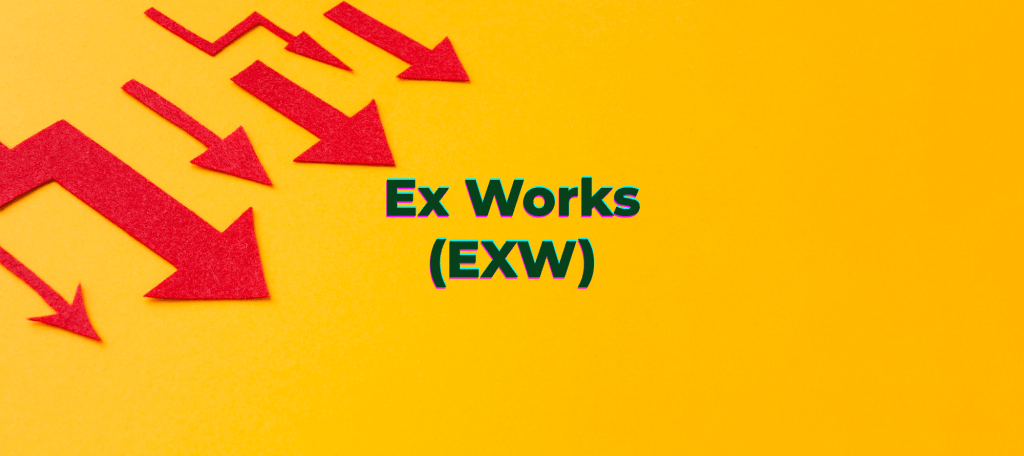
When comparing supplier quotes, be cautious if you find one that’s significantly lower than the rest. This discrepancy could be due to the supplier providing an Ex Works (EXW) price.
EXW is a term in international trade indicating that the buyer is responsible for all shipping and transportation costs from the seller’s premises.
Contrastingly, with Free On Board (FOB) pricing, the supplier bears the cost of transporting the goods to the nearest port. Hence, EXW pricing can appear much lower than FOB since it doesn’t include these additional transport costs.
Before finalizing a deal based solely on attractive pricing, ensure you confirm with the supplier whether the quote is for EXW or FOB to fully understand your cost obligations.
Minimum Order Quantity (MOQ)
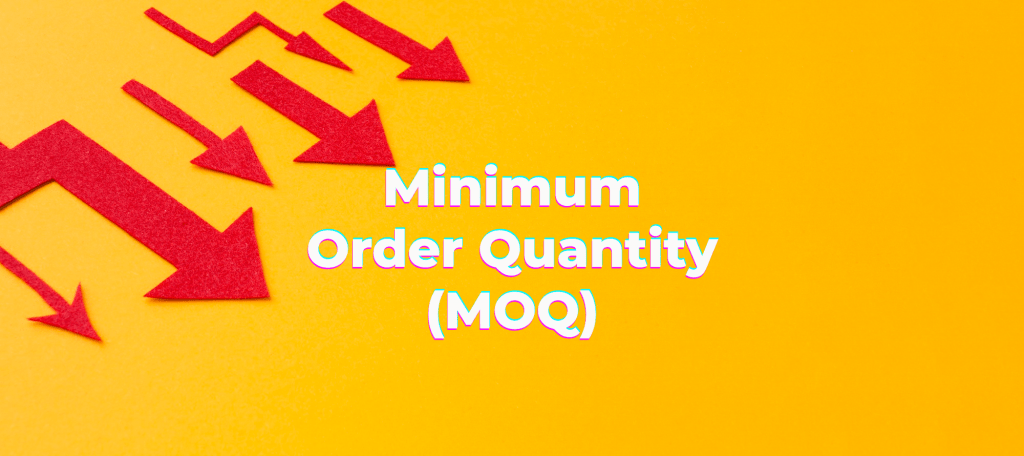
Keep in mind that numerous suppliers on Alibaba set a minimum order quantity (MOQ) requirement.
You may need to commit to purchasing a certain threshold of units, such as 200, 500, or even 1,000, to engage in a transaction.
Since operateing on a Alibaba wholesale model, ordering in larger quantities is a standard expectation and contributes to the reduced cost per unit. Bulk purchases are a fundamental aspect of Alibaba’s pricing advantage.
That’s why procuring and ordering samples from Alibaba before placing a large order is critical. Opting for a smaller quantity of samples allows you to assess the product’s quality firsthand.
Committing to a substantial MOQ without evaluating the product could result in significant issues if the items are not up to your standards, potentially leaving you with a large quantity of unsatisfactory goods.
Cost, Insurance, and Freight(CIF)
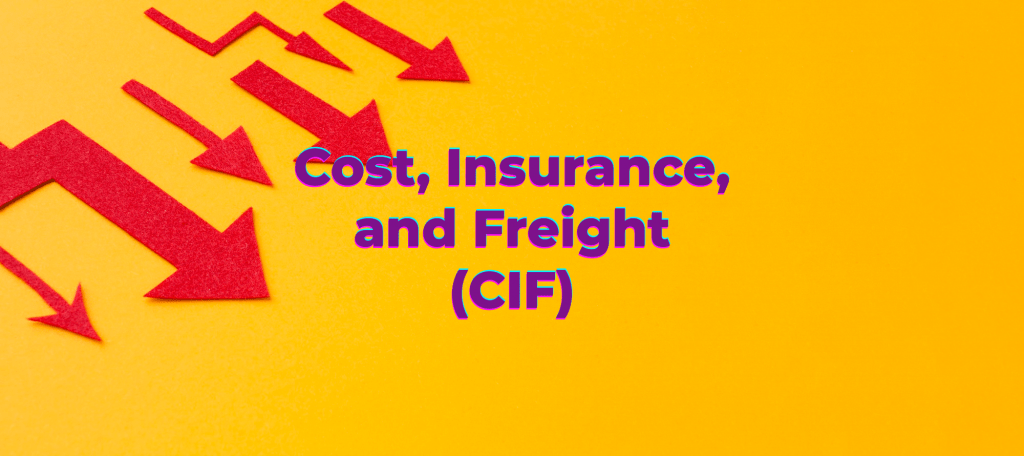
CIF (Cost, Insurance, and Freight) is a critical term in international trade that delineates the seller’s obligations up to the point the goods are delivered to the buyer’s nearest port.
Here is a closer look at the components of CIF:
Cost: This component covers the actual expense of the goods being purchased. Under CIF terms, the seller is responsible for all costs associated with manufacturing and preparing the goods for shipment.
Insurance: The seller is required to obtain insurance coverage for the goods during their transit to the designated port. This insurance should protect against potential loss or damage while en route. Although the seller arranges the insurance, the benefit of the coverage extends to the buyer, safeguarding their investment until arrival at the destination port.
Freight: The freight component encompasses all costs related to transporting the goods from the seller’s location to the specified port of destination. The seller arranges and pays for the shipping, ensuring the goods are safely and efficiently transported to the buyer.
Under CIF terms, the seller’s responsibilities end once the goods reach the destination port.
From that point onwards, the buyer assumes all risks and additional costs, including unloading the goods, paying any applicable duties and taxes, and arranging further transportation to their final destination.
Delivered Duty Paid (DDP)

DDP, or Delivered Duty Paid, is an incoterm where the seller assumes most of the responsibility, risk, and cost throughout the entire shipping process until the goods are delivered at the buyer’s designated location, fully cleared for import.
Here’s an expanded explanation of DDP:
Delivery: Under DDP terms, the seller is responsible for delivering the goods right to a named place in the buyer’s country, which could be the buyer’s premises or another specified location. This means the seller handles all transportation costs and logistics, including export and import duties, shipping, and any inland transportation within the buyer’s country.
Duty Paid: One of the key aspects of DDP is that the seller is obligated to pay not only for the transportation costs but also all the applicable taxes and import duties required to bring the goods into the buyer’s country. This includes dealing with all customs clearances and procedures, making it a hassle-free process for the buyer.
Risk Transfer: The risk is transferred from the seller to the buyer only when the goods are made available to the buyer at the named place of destination and not before. Until that point, any loss or damage to the goods is at the seller’s risk.
Cost Transparency: DDP terms provide the buyer with a clear understanding of the total cost of the goods upfront, including all shipping, handling, duty, and other associated costs. This can be particularly beneficial for budgeting and financial planning.
Seller’s Responsibilities: The seller needs to have a deep understanding of the import rules and regulations of the buyer’s country since they are responsible for clearing the goods through customs there. This can be a complex process, depending on the destination country’s regulations.
DDP is often considered one of the most comprehensive shipping terms for the buyer since it minimizes their responsibilities and risks.
However, it also places a significant amount of obligation on the seller, who must be well-versed in the logistics and legalities of international trade, including the specific import duties and regulations of the buyer’s country.
How Can I Use Alibaba’s RFQ To Get The Best Deals?
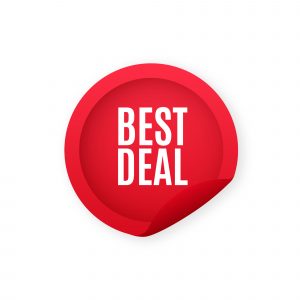
The Request for Quotation (RFQ) functionality on Alibaba.com is a dynamic tool that allows sellers to directly engage with prospective buyers.
Here, buyers specify their product needs, prompting sellers to propose pricing estimates. Utilizing the RFQ feature enables buyers to assess various offers, ensuring they secure the most favorable deals for their desired items.
Here’s a step-by-step guide to effectively using the RFQ feature:
Draft Your RFQ: Detail the product requirements, including its description or specifications, the necessary quantity, expected quality standards, delivery timelines, and any additional services you might need.
Evaluate Vendor Proposals: Limit your evaluation to a manageable number of vendors, ideally between 5 to 10, to simplify the decision-making process. Allow adequate response time for vendors, then analyze their proposals to identify which aligns best with your criteria.
Select the Best Offer: Choose the quote that provides the optimal balance of cost and quality. Retain documentation of this quote for reference in subsequent dealings.
Finalize Your Vendor Selection: Formally establish an agreement with your chosen supplier. It’s important to remember that the RFQ itself does not constitute a binding contract. Communicate your decision respectfully to the other vendors who participated.
By following these steps, buyers can effectively navigate Alibaba’s RFQ feature, streamlining the procurement process and fostering transparent, competitive vendor engagement.
Alibaba Shipping Costs
How To Ship Your Products From China
After finalizing your selection of products for shipment, it’s often more convenient to have your supplier coordinate the shipping and include these costs in your overall invoice.
For items weighing less than 200 lbs., air freight is typically the preferred method, with established international carriers such as FedEx and UPS being common choices for this service.
Conversely, for goods exceeding 200 lbs., sea freight becomes a more cost-effective option, though it generally necessitates engaging a freight forwarding service for logistical support.
The cost to air freight goods from China to the U.S. averages around $2.50 to $4 per pound. In contrast, shipping a container by sea freight can range from $2,000 to $3,000 per container, offering substantial savings for heavier or bulk shipments.
Import Fees
When you’re importing items from Alibaba or any other international marketplace, it’s crucial to consider several associated costs:
- Customs Duties: In the United States, if your imported goods exceed $800 in value, you will generally be liable for customs duties. Most products from China fall under this rule, except for certain exemptions like small-value consignments under $800 or specific items such as alcohol and tobacco which have their own rules. Each product category is assigned a unique HS (Harmonized System) code that is used globally to classify and define the duties applicable. In the U.S., this system is detailed as the HTSUS (Harmonized Tariff Schedule of the United States). By identifying your product’s HS code, you can accurately determine the duty rate that will apply.
Taxes: The tax implications vary by country. In some regions, you might be subject to additional taxes like the Goods and Services Tax (GST) on the items you import.
Import Fees: Beyond standard duties and taxes, certain jurisdictions impose extra fees on imported goods. In the U.S., this could encompass various charges such as Section 301 tariffs, anti-dumping and countervailing duties, and additional fees like harbor maintenance and merchandise processing.
Brokerage Fees: Engaging a customs broker can simplify the importation process, especially for complex shipments or navigating intricate regulations. Their expertise comes at a cost, reflected as brokerage fees, which are essential for facilitating your goods’ entry into the destination country.
Best Payment Options
Below is the hierarchy of payment options from most secure to least secure when engaging with suppliers on Alibaba:
- Alibaba Trade Assurance or Escrow
- PayPal
- Letter of Credit
- Credit Cards
- Bank or Wire Transfer
- Western Union
Please note: The common payment structure for Chinese manufacturers is a 30/70 split. This arrangement entails paying a 30% deposit upfront with the balance, 70%, due once the product manufacturing is finalized.
Alibaba Trade Assurance or Escrow

A key aspect of learning how to buy on Alibaba involves understanding the platform’s escrow service, which holds payment until buyers confirm satisfactory receipt of their order, adding an extra layer of security to the purchase.
The funds are placed in an account overseen by a neutral third party and are only released once the goods are confirmed to be delivered.
This service provides assurance to the supplier that payment is secured and awaiting the completion of the transaction terms.
Conversely, it reassures the buyer that their payment remains secure and will only be forwarded to the supplier once they have verified the quality and accuracy of the delivered products.
PayPal

While numerous Alibaba suppliers facilitate payments through PayPal, which is widely utilized by buyers, not all suppliers favor this method.
The apprehension stems from the potential risk of chargebacks, where suppliers might face financial losses if a buyer disputes a transaction dishonestly.
On the flip side, PayPal provides a layer of security for buyers, instilling a sense of assurance.
The platform’s protective measures can be particularly comforting, offering a safeguard in transactions that can mitigate various purchasing risks.
Letter of Credit
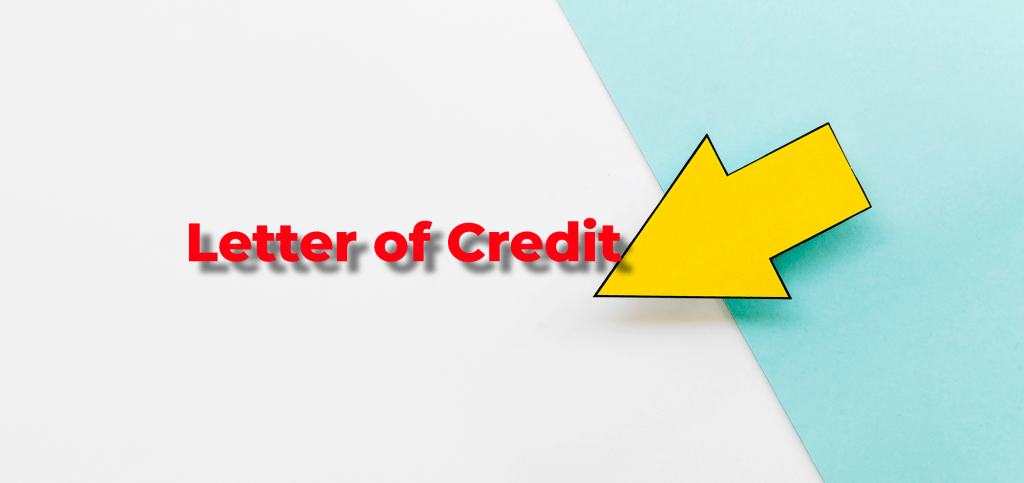
A Letter of Credit (LOC) is a financial guarantee from a buyer’s bank to the supplier’s bank, ensuring the supplier receives payment for goods shipped.
Upon receipt, the supplier confirms the LOC’s authenticity and dispatches the buyer’s order. Once the shipment is complete, the supplier presents the requisite shipping documents to their bank to redeem the value specified in the LOC.
Subsequently, the supplier receives the payment, while the buyer’s bank settles the amount with the supplier’s bank, ultimately debiting the buyer’s account.
Typically, utilizing a LOC for transactions is more common and practical for larger purchases, often above $15,000 or $20,000, due to the intricate and detailed process involved in its issuance and redemption.
The complexity and cost of setting up a LOC may not justify its use for smaller orders.
Bank Or Wire Transfer
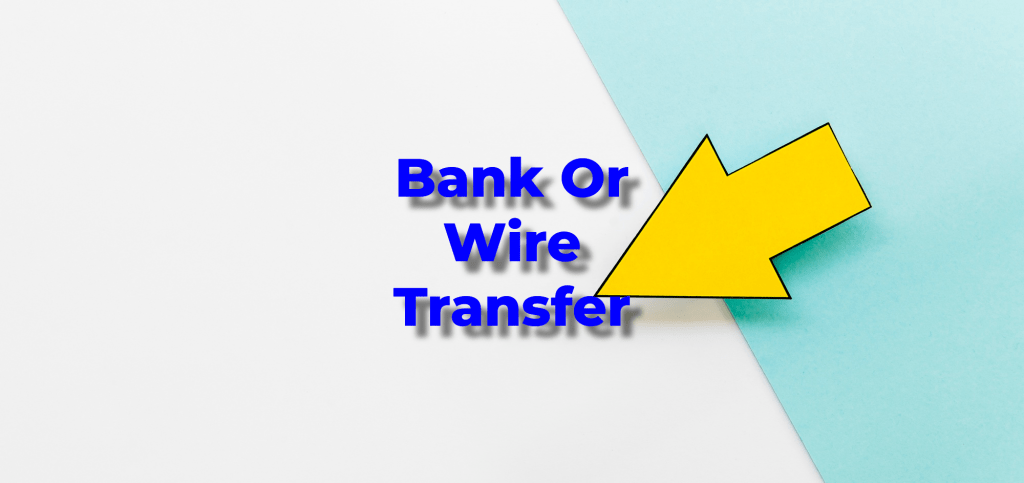
Wire transfers are a conventional method for making payments to Chinese factories, providing a direct and secure way to transact.
However, wire transfers can incur fees, so it is advantageous for buyers to establish a business bank account that offers free international transfers to minimize extra costs.
It’s quite common for factories in China to prefer wire transfers for their simplicity and directness, often insisting on this payment method exclusively.
Western Union

Using Western Union for payments on Alibaba is generally discouraged. If a supplier insists on this payment method, it should be considered a significant warning sign, potentially indicative of a scam.
The primary concern with Western Union is the lack of recourse or protection for your funds once the transaction is completed.
If the supplier turns out to be fraudulent, retrieving your money becomes virtually impossible.
To enhance security, it’s recommended to opt for escrow services whenever possible, which offer a safeguard for your payments. Such protective measures are particularly crucial when establishing relationships with new suppliers, ensuring your financial risks are minimized.
How To Track Orders?
To monitor your Alibaba order, locate the Alibaba tracking number provided in the “Shipping Details” section on your “Orders” page.
Subsequently, access the website of the designated carrier and input the Alibaba tracking number in Alibaba tracking system to view the real-time status and any progress updates of your shipment.
Alibaba provides an additional safeguard through its Trade Assurance Delivery Guarantee for ready-to-ship products.
In the event of any delivery delays, you might be eligible for compensation, which can be up to 10% of the total order value, with a maximum limit of $100.
What Is Alibaba’s Return Policy?
Alibaba’s Easy Return service, part of their Trade Assurance offering, facilitates straightforward return processes for orders that are classified under “poor quality” or “wrong materials” provided the total order value is below $3,000.
When your Easy Return request receives approval, a 15-day window is allotted for you to send back the items to the specified warehouse.
If you opt for the designated shipping methods affiliated with the warehouse, the return shipping will be free.
However, should you decide to use an alternative shipping method for the return, the associated costs will fall on you. This service underscores Alibaba’s commitment to customer satisfaction and trust in their platform’s order quality.
Can I Use Alibaba For Dropshipping?
Indeed, utilizing Alibaba for dropshipping is feasible, though it presents certain challenges due to the platform’s primary focus on Alibaba wholesale transactions.
Most Alibaba vendors prefer dealing with bulk purchases, which are more profitable for them, making them less inclined to handle small, individual orders typical of dropshipping. Despite this, there are suppliers on Alibaba who are willing to accommodate dropshipping needs.
Here’s a brief overview of how to implement dropshipping with Alibaba:
Integrate Your Store with Alibaba: Establish a connection between your online store and Alibaba to streamline operations.
Select Products: Browse Alibaba to identify items that align with your store’s theme or your market research.
Import Products: Once chosen, import these product details into your online store, preparing them for customer viewing and purchase.
Automated Order Fulfillment: When you receive orders, they can be automatically forwarded to the respective Alibaba supplier for fulfillment.
For additional guidance and detailed procedures on Alibaba dropshipping, you can refer to specific resources provided on their platform or relevant online tutorials and guides.
Conclusion Of Buying On Alibaba
It stands as a prominent Alibaba wholesale platform, bridging the gap between global buyers and suppliers, offering an extensive range of products at competitive Alibaba wholesale rates.
Learning how to buy on Alibaba can help entrepreneurs and small businesses work with suppliers without getting scammed.
By leveraging Alibaba’s vast selection, businesses can access products at prices significantly lower than retail, enhancing their profit margins when selling online.
While Alibaba presents opportunities to secure products at attractive prices, due diligence in selecting a trustworthy supplier is key to ensuring you receive quality goods and favorable terms.
In essence, Alibaba is an invaluable resource for businesses looking to private label products and secure optimal pricing.
Best wishes on your Alibaba purchasing journey!
